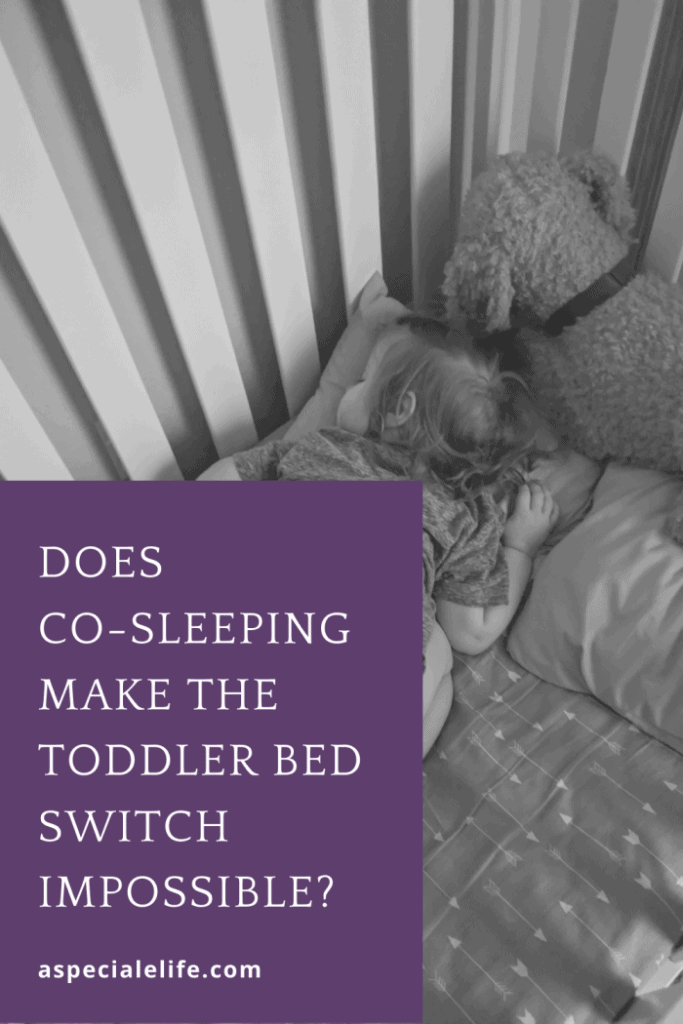* This article has affiliate links. I may make a commission on any purchase made through these links at no additional cost to you.*
Are you desperate to figure out how to get your toddler to sleep in their own bed? I understand the struggle. Making the transition from crib to big boy bed for our first was relatively simple. Our second-born was a completely different story.
So, I understand the desire to make the transition easy. We all want our toddlers to keep their regular daily schedules without needing an extra nap during the day.
If you’re ready to have your own bed back and have a well rested kiddo (and self!), these tips are sure to help you get there.
Page Contents
Challenges Switching from Co-Sleeping
It seems hardest to make your child sleep in their own bed when they are used to sleeping with their parents. For us, our son (the first born) had already been sleeping in his crib alone for almost 2 years. We made the switch from cosleeping to a crib in his own room around 10 months. When the time came to put him in a bigger bed, it was relatively simple.
One of the biggest challenges that came with switching my toddler to his own bed was getting him to understand an appropriate time to get up. That problem was quickly solved with a Hatch Baby Rest Sound Machine, Night Light and Time-to-Rise. This is a product that I will sing praises for until the end of time! It is a nightlight and sound machine that can change colors when it is time for your kiddo to get out of bed. We have the original, but I’ve heard amazing things about the newest version Hatch Rest+ Baby Sound Machine, Night Light, Time-to-Rise Plus Audio Monitor, White Noise Soother, Toddler Sleep Trainer, Kids Alarm Clock, Nightlight
as well.
The challenges we faced in switching directly from co-sleeping to toddler bed have been much more difficult. Our daughter slept in our bed for much longer than her older brother did. After her first successful night in her bed on night one, we thought we were golden. It was a surprise to find her in our bed the following night and the night after that.
It can be incredibly difficult to get a toddler to sleep in his/ her own bed when they are completely unused to being alone.

Sleep Habits to Be Aware Of
Many children develop sleep habits that have to be brought over to a new sleep space. Think of every action and item it takes for your child to fall asleep. Do they require a certain blanket? Is there a stuffie that they can’t be without? Does it take nursing or a sippy cup? Bring the habits that you can into your child’s new bed.
One of the sleep habits that is difficult to bring to the new bed is YOU. It could be your smell, your warmth, or just your presence – your child wants you. You are familiar and their new bed is not. This might mean that you have to sit on the floor next to them until they fall asleep. It might also mean that you have to bring some form of you to their bed. A used blanket or a t-shirt with your scent can provide a lot of comfort in an unfamiliar environment.
How to Create a Sleep-Friendly Bedroom
You can help your child adapt to their new bedroom by creating a sleep-friendly environment. For many children, this is crucial in learning how to get your toddler sleeping in their own bed. Toddlers can get excited if they are allowed to pick out their own bedding. Let them help to create their own space.
A sleep-friendly room is also one that has an adequate nightlight. Fear of the dark is a common reason kids end up in their parent’s bed in the middle of the night. Assuage that fear by being proactive. A noise machine can also help to keep your child asleep for longer – unexpected noises are less likely to wake them.
Develop a Step by Step Plan of Action
Not only should you have a plan of action, but you must share it with your child. It can be hard to explain it to a toddler, so use a vocabulary that your child can understand. Plan how you’ll introduce the change, what will be brought from mom and dad’s bed to your child’s bed, and that you will still be there when he or she wakes up in the morning.
Write out your plan. It always helps to stick to it when the plan is written down. Be sure to consider what actions will be taken when your child comes to your bed at night. Think about the praise you’ll offer when they make it a night alone. Be sure to consider every perspective you can and know each step prior to discussing it with your toddler.

Making the Change to Sleeping Alone
Now that you’re ready to make the change, it’s time to take action. Deciding to get your toddler to sleep in their own bed is a difficult decision for many parents. Others feel ready to make the switch. No matter where you are in the change, doing so with intent is important.
Set Clear and Firm Boundaries
Set your boundaries early on in the process. Maybe you are okay with your toddler getting in your bed if it’s after 6 am – make that clear. Or, maybe you feel like that only causes confusion and want to avoid that. Whatever your boundaries are, set them and stick to them.
Communication
Always communicate with your toddler in the best way you know how. It can be confusing to suddenly be asked to sleep elsewhere. Many adults struggle to get a good night’s sleep in an unfamiliar bed – toddlers experience this, too! One of the most important rules of basic how to get your toddler to sleep in their own bed is to explain what is happening.
Remain Calm
It can be frustrating to be woken up in the middle of the night. When you’re tired and want to sleep, many parents struggle with staying calm. It is important that you don’t get angry with your toddler. He or she is learning something new – it isn’t always going to come easy. Take a breath and respond with a calm attitude.
Don’t Give In – Be Consistent!
When I’m in a deep sleep, the last thing I want to do when woken up is get up. However, if you truly need your toddler to sleep in their own bed, you must be consistent in making them sleep there. If you wake up to a body in your bed that wasn’t there before, it is important that you carry them back to bed. Even if they are awake and you have to sit on the floor, don’t give in to their desire to sleep with you.
Bedtime Routine
Having a bedtime routine is crucial to getting your bed back. From brushing teeth to a bedtime story, a good routine will prepare your toddler for sleeping on their own. Eventually, their routine will include sleeping in their own bed all night.

Consequences vs. Praise
Some parents feel the need to give consequences for a toddler that is unwilling to sleep in their own bed. Personally, I feel that praise is far more effective in getting a child to sleep on their own. While negative consequences might make your child see that they should be in their own bed, not all consequences achieve the end goal that you want. Positive reinforcement, however, is typically a better route.
“…praise is far more effective in getting a child to sleep on their own.”
Some ideas for positive reinforcement include a sticker chart, a small prize, or even a fun breakfast. Make sure your toddler knows that they got a smiley face on their pancakes because they stayed in their own bed for the night. Positive reinforcement can make a huge difference in how toddlers respond to their own beds.
Take on Issues One by One
If and when additional issues arise, parents must tackle them immediately. Whether that means making changes to the toddler’s bedroom when new fears are made known, leaving their bed to play in the living room, or maybe getting into bed with a sibling, handle those problems (if you believe them to be problems) as they come. Putting off solutions can only cause harm in the long run.
What Age Does My Child Need to Be in Their Own Bed?
This is a question that many parents have. Truthfully, if you’re researching how to get your toddler to sleep in their own bed, you either want to make the switch or someone has made you feel like you need to. The simple answer is there is no right answer.
Some parents feel that a child needs to be in their own bed from birth. Others think that he or she should be at least a year old. Many still comfortably have kids in their bed well into childhood. The answer to the question is: whatever age you are comfortable with.
If you want your 18 month old in your bed, keep you 18 month old in your bed! If you want your own space back, start moving your toddler to his/ her own bed. The decision should be the parents’ decision alone.

